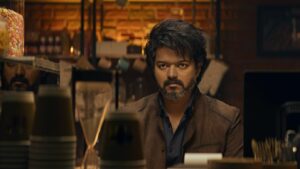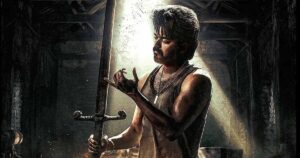After making a paradigm shift in Indian action genre with Vikram, the prodigal Lokesh Kanagaraj’s next venture had its own skyrocket expectations amongst the masses. That too when it was announced that Lokesh’s next was with “Thalapathy” Vijay for the second time, the expectations gone out of the roof and finally Leo roared on the silver screens this week.
There’s always this pressure for a creator who has achieved his pinnacle form at an early stage which is to deliver another work that beats it and Lokesh is in that kind of a challenge.
Let’s see if this Leo‘s roar was loud enough or not. And it’s a challenge every time for me to write on a newly release big star movie.

The subtle massiness and a fixed narrative tone:
From the opening credits Lokesh declares that Leo is an official adaptation of John Wagner’s A History of Violence comic, where a hero who doesn’t want get into his violent roots is forced to take it up due to circumstances.
This template has been a staple for most of the commercial masala films as it offers for most part the catharsis needed for viewers who are mostly helpless about the vices that happen around them yet having the urge to beat ’em all.
With “Thalapathy” Vijay in the lead with his stardom stripped down for most part, he plays as Parthiban a cafe owner who lives with his peaceful family but has a violent past as Leo. He has a consistent character sketch where he shows a clear contrast between the two characters.
The cafe fight scene can be seen as a great example where he showcases the anguish, the guilt, the fear and a macrocosm of emotions. It might not be an overstatement to say Leo is a Vijay “Film” after ages. His family dynamics makes you really care about the stakes on hold.
More than the star, the character of Parthiban is seen for most part which is another surprise for a Vijay starrer something reminiscent of famous Hollywood action movies making the “mass” factor more subtle. Unlike his previous movies which had a lot of subplots and layers in the narrative, Lokesh Kanagaraj and his writers crew of Rathna Kumar and Deeraj Vaidy takes the most straight forward route for this Baasha template and it’s focussed in its narration.
While there are some complications in this approach which I will come to later yet this was a surprise move from Lokesh making room for more action in the film. With a much simple setups in the first half, the payoff rewards well despite being in a template that is beaten to death.

The meticulous action and technical expertise:
There are two types of action movies: one is where there is story written around the action sequences and the other where action sequences are written round the story. Leo belongs to the former category for most part and Lokesh Kanagaraj as a writer and director totally shines in the action sequences.
From the first Hyena sequences to the climax 1 vs 100 fight scene there’s a lot of meticulousness put into the tiniest of details in staging and writing these sequences. You can see the protagonist getting tired during the combats which is a rare sight for a Vijay starrer.
The CGI works which isn’t much of a forte of Lokesh was pretty convincing making the unbelievable real. Combined with Anbariv’s dynamic stunt choreography, Manoj paramahamsa’s kinetic camera work, Anirudh’s surprisingly great choice of Soft Synth and EDM, Philomin Raj’s classy cuts (not to mention the amazing match cuts) does great wonders for the adrenaline pumping theatrical experience for an action film of sorts like this.
It’s good to see some of the creative choices made for the action sequences especially those Mocobot cam shots, the dolly zooms, the serial view fight scenes (reminiscent of True Detective S01) and the POV shots in an Indian Mainstream action film like this.

Hollywood and Peaky Blinders overdose:
Lokesh in many interviews mentioned about the impact of 80s Hollywood action films and Peaky Blinders series in his filmography.
While it’s good to see Lokesh Kanagaraj delivering a Hollywood styled approach in the Indian action genre and it’s palatable for most part, it just feels that the Hollywood pill has been overdosed a lot which is evident in the second half after the subtler interval block.
While exploring the world of Das and Co in the 20 min flashback, the Peaky Blinders influence is on the face with particularly with those occult beliefs of the “Family”, I lost it as a viewer.
In a series like Peaky Blinders it took six seasons to establish the family dynamics, the world etc. But here Lokesh condenses into a mere flashback making this unconvincing for the viewers which made the reason for Leo turning into a reformative person pretty much not fleshed out making it a badly made pastiche of its inspiration.
In the car chase sequence they tried to mimic the one shown in Raid 2 but unfortunately due to the mishaps in the CGI in that part and the payoff at the end of that sequence made it a case of yet another mere imitation.
I don’t really want to bring a lot of comparisons into this but when you take Baasha or John Wick the reason for the respective protagonists to reform themselves is made convincing which is particularly the reason it made them most rewatched films of all time.
The “Indianness” and an even more convincing emotional setup for the action set pieces was lacking in the film making it alienated. I wished the flashback would have been just a voice over narration by the characters just like they did for some parts in defining Leo’s character.

Undefined motive of the antagonists and more straight forwardness:
The supposed antagonists Anthony Das (Sanjay Dutt) and Harold Das (Action king Arjun) are menacing in their acting and does bring the condescending nature to the characters.
Leo is shown as an underground Rowdy character for the Das Family and business and he isn’t shown much of a guy who believes in brains over brawn. But their motive to kill Leo even after 25 years isn’t just really defined and hard to buy. Whether he has any secrets about the tobacco factory business? Or the datura business? Nothing – it’s just plain revenge which doesn’t really make you care about the stakes and the antagonism of the villains.
Just like in the first act, the film could have been even more consistent with its straight forward approach which would have made for an even more adrenaline pumping gratification.

The cinematic universe problem:
This is a problem that’s been on the cards in the recent years even the most established cinematic universes in Hollywood like the MCU, DCEU and other universes struggle to make use of the network narrative which they used it at first.
Cameos of certain characters don’t really make the audiences buy into these cinematic universes anymore which lead to some of the most interesting choices of narrative in recent years like Spiderman Across the Spider-verse.
I’m not expecting Lokesh to make an ATSV as LCU is in its foetus stage but considering the potential the universe it felt like the integration of it into the storyline of Leo makes it a bit of a “cash grab”. There could have been more interesting choices of setups if they’re gonna bring this into a cinematic universe but cameos of characters like Napoleon from “Kaithi” does deteriorate arc of them built in the first place.
And the Nick fury moment is yet another instance which made me feel like this could have been a standalone unpretentious film.
The audience reaction for it was pretty much baffling when I left the theatre as they were discussing a lot of “theories” and I wondered where was there a space to even make fan theories.
Glass Onion is the fitting term to describe the audience discourse that’s surrounding this LCU. The most interesting aspect of George Lucas’ Star Wars universe is that it didn’t rely on any base reference material unlike Marvel or DC but it went to be the highest grossing and critically acclaimed franchises of all time cinema. Lokesh Kanagaraj and writers’ team are going in the same trajectory like George Lucas with the LCU but I wish that he puts more introspection time into making a planned network narrative needed for a cinematic universe.
But let’s give props to the director-writer that all the LCU films are distinct in tone with each other.
Nonetheless, Leo is Lokesh Kanagaraj’s Bayhem providing a gratifying dose of silver screen adrenaline and it roars majestically!